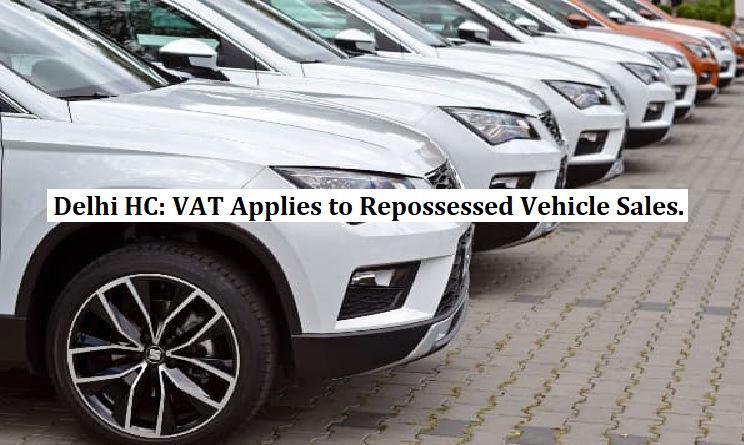


The Delhi High Court recently ruled that the sale of repossessed vehicles is subject to the imposition of value-added tax (VAT). Justices Vibhu Bakhru and Amit Mahajan presided over the case, where the petitioner, Indusind Bank, a scheduled bank, challenged the applicability of VAT on the sale of vehicles repossessed by the bank.
The court observed that the notices issued to the petitioner demanded VAT specifically on the sale of repossessed vehicles and not on the initial transaction involving the financing of these vehicles. Indusind Bank argued that the expansive definition of the term 'dealer' under the Delhi Value Added Tax (DVAT) Act contradicts the objectives of the legislation. The petitioner contended that the definition of 'dealer' was ultra vires Article 265 of the Constitution of India.
Indusind Bank, as the petitioner/assessee, expressed its dissatisfaction with notices issued under Sections 32 and 33 of the DVAT Act, which sought to recover tax, interest, and penalties. These notices held the petitioner liable for VAT as a dealer concerning the sale of repossessed vehicles.
The crux of the petitioner's argument lay in the assertion that it did not contribute any value to the repossessed vehicles. Instead, it merely engaged in selling them on behalf of the borrower to recover outstanding dues. Indusind Bank argued that imposing VAT on the sale of repossessed vehicles amounted to taxing a transaction without any actual value addition.
However, the court rejected the petitioner's claim that the definition of 'dealer' violated the Constitution of India. It pointed out that Article 265 of the Constitution stipulates that no tax can be levied without the authority of law. In this case, the DVAT Act constituted the law under which the tax was sought to be collected, and the court acknowledged that there was no dispute about the legality of the tax collection under the enacted law.
The court emphasized that any challenge to the definition of 'dealer' on constitutional grounds must demonstrate a violation of a specific provision within the Constitution, rather than a broad assertion of ultra vires status. In other words, the mere fact that the petitioner argued that the definition of 'dealer' went against the Constitution was insufficient; there needed to be a specific violation of constitutional provisions.
The petitioner's position centered on the belief that VAT should not be applicable to the sale of repossessed vehicles since the bank was not engaged in value addition during this process. Instead, the bank saw itself as facilitating the sale on behalf of the borrower, primarily for the purpose of recovering outstanding dues. However, the court's decision underscored the legality of imposing VAT under the existing legislative framework, dismissing the petitioner's constitutional challenge.
In conclusion, the Delhi High Court's ruling affirms the applicability of VAT on the sale of repossessed vehicles, emphasizing the legality of such taxation under the DVAT Act. The decision reinforces the importance of specific constitutional violations rather than broad challenges to legislative definitions.
TAGS: Indusind Bank Constitutional challenge Article 265 Ultra vires Tax liability Sections 32 and 33 Tax recovery